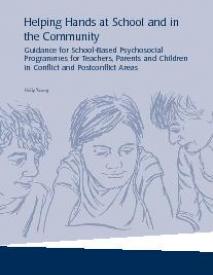Helping Hands at School and in the Community: Guidance for School-Based Psychosocial Programmes for Teachers, Parents and Children in Conflict and Postconflict Areas
Abstract These guidelines are the result of a collaboration between the War Trauma Foundation (WTF, www. wartrauma.nl/en), its local partner organisations (in the Occupied Palestinian Territory (OPT), Chechnya, Ingushetia, North Ossetia-Alania and Kosovo) and the Dutch development organisation PSO (www.pso. nl/en). As part of the PSO trajectory, we have analysed our capabilities as organisations to successfully implement the 5 Cs (the capability to survive and act, the capability to adapt and self-renew, the capability to generate development results, the capability to relate and the capability to achieve coherence). In these guidelines, we use these insights to extract some key principles, strategies and methods to develop and implement school-based psychosocial programmes (SBPPs). They are intended to provide practical support to any individual or organisation planning, implementing or supporting an SBPP in a conflict or postconflict setting. This support is provided through presenting WTF’s experiences with its local partner organisations, explaining the process of setting up and implementing an SBPP, identifying common problems, pitfalls or challenges they have encountered during the course of the process and suggesting solutions that they have found to be effective in solving them. Some tools and approaches that WTF and its local partner organisations use are also provided. Case studies from each of the local partner organisations provide background information and place the advice given within these guidelines into context. The War Trauma foundation (WTF) is based in the Netherlands. Since its foundation in 1997, it has been working towards the realisation of hope, peace of mind and the achievement of the full potential of communities following war or organised violence. It works with civil society organisations in low and middle income countries, supporting the development and exchange of knowledge and building capacity and innovation in psychosocial support. Most of its activities are community based and set in a conflict or postconflict setting. WTF is active in several regions including, at the time of writing (September 2012), the Democratic Republic of Congo, Burundi, Chechnya, North Ossetia-Alania, Ingushetia, Kosovo, the Occupied Palestinian Territory, Egypt, Sri Lanka and Sudan.
Geachte bezoeker,
De informatie die u nu opvraagt, kan door psychotraumanet niet aan u worden getoond. Dit kan verschillende redenen hebben,
waarvan (bescherming van het) auteursrecht de meeste voorkomende is. Wanneer het mogelijk is om u door te verwijzen naar de bron
van deze informatie, dan ziet u hier onder een link naar die plek.
Als er geen link staat, kunt u contact opnemen met de bibliotheek,
die u verder op weg kan helpen.
Met vriendelijke groet,
Het psychotraumanet-team.
Diemen : War Trauma Foundation


